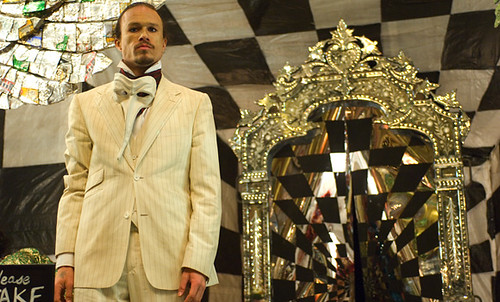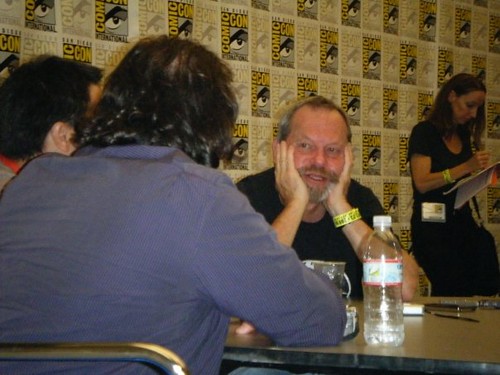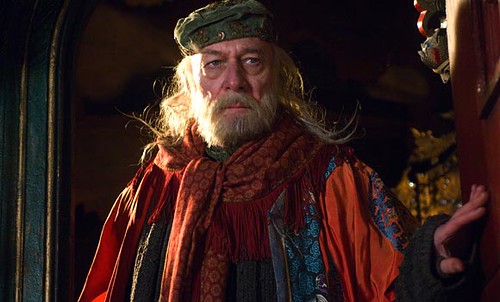Terry Gilliam joins William Bibbiani at Comic Con 2009!
Terry Gilliam, the critically acclaimed director of Time Bandits, Fear & Loathing in Las Vegas and The Adventures of Baron Munchausen, and the only American member of the Monty Python comedy troupe, is an indelible part of the back story of any movie geek. But Gilliam has always been a relatable figure in the entertainment industry, partly because of his down to earth persona, but largely because practically all of his productions encounter serious production problems that he must struggle valiantly to overcome. From the studio interference on Brazil to the cataclysmic shooting difficulties that permanently shut down The Man Who Killed Don Quixote, Gilliam has proven himself a modern Sisyphus, rolling each unforgiving boulder up a hill only to find that the same titanic effort awaits him shortly afterwards. Fortunately, most of his movies are well worth the effort.
Gilliam’s latest uphill battle, The Imaginarium of Doctor Parnassus, provided the director with one of his greatest challenges: completing a film after the death of its star, Heath Ledger, who died last year with only half of his performance completed. Sitting down for a roundtable discussion with Geekscape and others, Gilliam guided us through the difficult process of completing the film with three new actors (Johnny Depp, Jude Law and Colin Farrell), his latest attempt to film The Man Who Killed Don Quixote, and his thoughts on Zack Snyder’s The Watchmen, a film Gilliam himself attempted to make 20 years ago.

Terry Gilliam: (Entering, sitting down) – I’ve said it all out there. I’ve got nothing to say.
William Bibbiani: Well, we weren’t there, but that’s good! You’ve had practice, you can just say it all again.
At this point, one of the individuals at the roundtable asks Terry Gilliam the decision-making process behind completing the film without his star, Heath Ledger.
Terry Gilliam: Well, half the part’s done, what do you do? What do you do? You’ve got about 45% done… For the first couple days you’re like, “Fuck, this is ridiculous.” The challenge is actually to see if you could resuscitate my energy and belief in it, because I just said “It’s over.” And did we want to continue, because Heath was so important? And I was surrounded by too many people who said, “Fuck you. You’ve got to go back to work and fix this baby. Do it for Heath.”

Luckily, the mirror is the key, the thing that saved our ass. He had finished most of the stuff on this side of the mirror. I did this slight alteration that when you go through the mirror your face can change depending on who you’re with and whatever’s going on. And that was basically the change. The problem was, how do you get three actors to take over the part? Because there’s no way one (would work)… I didn’t want that. So the three, we’re all friends and then we had to dance around their schedules… We didn’t have time to rehearse, so we didn’t know if any of it was going to work. So the trick was, in many ways, just marching blindly forward without a lot of confidence that it was going to work. And then when I cut it together and showed it to a couple people in London, and they assumed it had been written that way. And I said, “It’s working.”
William Bibbiani: Was the footage seamless? Were there any pieces of Heath Ledger’s performance that don’t fit into the movie now that you have all these other actors? Like, you shot “some” of the Colin Farrell sequence…?
Terry Gilliam: No, everything is in the movie. Even some bits he didn’t do is in the movie. I won’t explain that, how that works.
And the other thing, when you see it, we didn’t change the words. You’ll find words in there that are just shocking that they seem to be so prescient. And everybody thought that we wrote that as sort of a eulogy to Heath, after he died… There is one line that Chris Plummer didn’t want to say, which is he’s talking about stories, stories of romance and comedy. The tale of an unforeseen death. He didn’t want to say it, and I said, “You’ve got to say it Chris. That was the movie Heath and I were making.”
Anyway, it got done somehow, and now when people look at it they just can’t believe that it wasn’t intended, which is a very strange thing. It actually disturbed me slightly because I’ll never know what the film was going to be like if Heath had lived to do all the parts. He had so much planned, so many ideas floating that were going to surprise everybody. They’ll never see it. (Laughs, a bit sadly.)
On the subject of shooting the visual effects, and in particular Gilliam’s use of storyboards, the director had this to say, including a description of how Johnny Depp came aboard:
Terry Gilliam: This one I actually did my own storyboards, and I haven’t done that since Munchausen, so… I only storyboard the stuff that’s going to be effects. I don’t storyboard rest of it, the live-action stuff. I just shoot it.

…Things that were going to be shot possibly outside with Heath, on the other side of the mirror, we had to do on blue screen because Colin (Farrell) and Jude (Law) and Johnny (Depp), if we had to do anything that required exteriors we were buggered, we couldn’t do it. So we controlled situations on a stage, because we didn’t know when they were going to be able to turn up or not. We were constantly shifting the schedule because, “Who could make it?” And the thing with Johnny, even though he was the very first to say “I’m in, whatever…” I asked him if he would help, and he says “I’m there, whatever you need” (And) this is before I worked out what I was going to do! (Laughs.)
And then it became very difficult because he was in prep for Public Enemies. And then because there is truly a God, and because he’s not really hurting me all the time, he came to me and said, “Public Enemies has been delayed by a week. (Terry Gilliam makes an elaborate Tex Avery-inspired noise in celebration.) Damn it, (hurry up) before Michael Mann catches you!”
When asked about Johnny Depp’s involvement with Gilliam’s latest production of The Man Who Killed Don Quixote (Depp was set to star in the original, now defunct film):
Terry Gilliam: No. He’s not going to. We’ve talked about it; he’s signed up for so much stuff and I want to be shooting next spring and it’s just not going to work. And I think he felt that we went at it once, and I don’t know if it’s superstition or just I’m a nutcase, and he’s probably correct. (Laughs.) He’s probably absolutely right, but he’s smarter than I am. (Laughs again.)
William Bibbiani: Who do you want for the role now?

Terry Gilliam: Uh… I can’t tell you who it is. I don’t have people yet, but we’re starting that process.
William Bibbiani: Well, let me ask you this, because a lot of us have seen the documentary (Lost in La Mancha, Keith Fulton and Louis Pepe’s 2002 documentary about the collapse of Gilliam’s first attempt to film The Man Who Killed Don Quixote) and we’re all big fans, will some of the things that we saw in the documentary, are they still things that you want to be part of the movie?
Terry Gilliam: Nothing you saw will be in the movie. We’ve rewritten it quite a bit.
William Bibbiani: Okay. Even the visual themes? We saw the thing with the puppet men, anything like that?
Terry Gilliam: We just cut that out… I might sneak one back in. These are budgetary things. I might slide one back in.
William Bibbiani: As an homage to the documentary.

Terry Gilliam: (Laughs*) – Yes, exactly! That’s very nicely put.
Someone Else: And then you can do a documentary about the homage to the documentary!
Terry Gilliam: It can go on forever! We can put a musical on stage and then they can film the musical.
Another reporter at the roundtable asked if Terry Gilliam had seen The Watchmen:
Terry Gilliam: Yeah… I thought visually it was really impressive. I thought (Zack Snyder) really did it, but I also thought at the same time, “You need a real kick up the ass.” He was too respectful of the book. That was the problem, and the pace of it, just – I mean, that was our problem when I was working on the script. “How do you get all this stuff in there?” You can’t. He got it spot on, the look of it. Great characters, I mean Rorschach was wonderful, lots of good stuff, but (sighs) come on, move this thing!
I’ve got a theory about it too, because in the book you’re looking at shots. The Comedian’s flag-draped coffin going into the grave. I think it’s three panels, I can’t remember. (Illustrates rhythmically with his hands) –Thunk, thunk, thunk.
In the film? Thuuuuuuuuuuuuuuuuuuunk. That was the problem.
William Bibbiani: Well, it’s also paced weirdly because it started out like a murder mystery, and then we lose the murder mystery. And when you’re watching it all in one chunk like that, you get bored. “What happened to the murder?” You can lose track of (that plotline) in a book, but not in a film…
Terry Gilliam: Well that was what I was saying, long before they started doing it, was I thought it should be a five-part TV series. Because then you can, ahhhhhhh… (Terry Gilliam breathes deeply).

William Bibbiani: You’d have the freedom to forget about stuff.
Terry Gilliam: Yeah, exactly. And it would work. That’s why I was glad that Joel Silver and I couldn’t raise the money because it would be one of those things I’d really be terribly embarrassed about (laughs).
Some Other Guy: You discussed in the panel how you started out on Python reworking classic pieces of art, and using the art of dead people. Do you think that your experience with reworking old pieces of art helped you with rejiggering the story of Parnassus?
Terry Gilliam: No, because I didn’t rejig the story. It was basically a very simple thing: “Will it work if you change the actor on the other side of the mirror?” So everything was basically the same, and literally the only thing I changed was – and you see it in the clip there, with the drunk – after she smacks him, he falls down and comes up (and) his face has changed. That was the one change I made. So now we’ve established a face can change…

Our problem was dealing with scenes on this side of the mirror that Heath hadn’t finished. I had to pull those around. I pulled one and stuck it up the other side of the mirror. Jude does this scene with (Andrew Garfield)… I had these scenes that I thought I could pull off on (Heath Ledger’s) side of the mirror with maybe a double in there, but it just was clear that I was not going to get away with this. It’s just not going to work. So I threw that scene on the other side, and it actually works out better… And another scene we just cut out.
I kept saying Heath is sort of editing and directing this film posthumously, because he’s created situations that I can’t get out of, basically. And that’s why in a sense he gets a co-directing credit on this, because “Heath, you’ve made it what it is.”
I mean, we’ve got a credit on the film where it’s supposed to be “A Film by Terry Gilliam?” I said, “Fuck that. It’s a Film by Heath Ledger and Friends.” That was the actors, all of us sitting around one night in Vancouver and the idea came up. “Heath and Friends made this movie.” Terry Gilliam is one of those friends.
Another reporter asks about Christopher Plummer: “He’s always been a wonderful actor… What did you want him to bring to the film that you haven’t seen before?”

Terry Gilliam: I just wanted him to bring all of his talent to the film, the kind of gravitas – I mean, he’s just an extraordinary actor. His theatrical work has always been amazing, his film work: there was The Sound of Music, let’s not forget The Sound of Music (laughs). He wants to forget about it. We’d be on the set, and I’d start going (hums The Sound of Music, laughs). It’s the one way I could always irritate him.
There’s interesting things, you see. Amanda Plummer, his daughter, she was in Fisher King. So here was a man with a daughter (like Dr. Parnassus, Christopher Plummer’s character). I’ll tell you there was one scene in there where we were rehearsing, and I said “Parnassus enters at this point.” And he says, “I don’t think so.”
“What do you mean, Chris, ‘You don’t think so?’ The script says. I wrote this.” He says, “Nah. Parnassus, he’d just be standing around with nothing to do.” And I say, “Okay Chris, where do you think you ought to come in?” He says, “Down there.” And he was absolutely right.
That’s the great thing about a theater actor. They know how to make entrances and exits.
And finally, one last reporter asks Terry Gilliam about making films without a net. Does he ever have a Plan B? If Don Quixote falls through, is he finally planning to make Good Omens?
Terry Gilliam: No. I mean I only know how to do one thing at a time. It’s unfortunate, but I don’t know how to split my attention. I just believe totally in something and go for it… until it clearly isn’t going to happen, and then having spent a year or two I move on. I keep saying, because it’s taken so long to get each one off the ground, that I’ve been saved from making as many bad films as other directors have. There were more possibilities that I could have made some real turkeys.
*That’s right, I made a cast member from Monty Python laugh.
